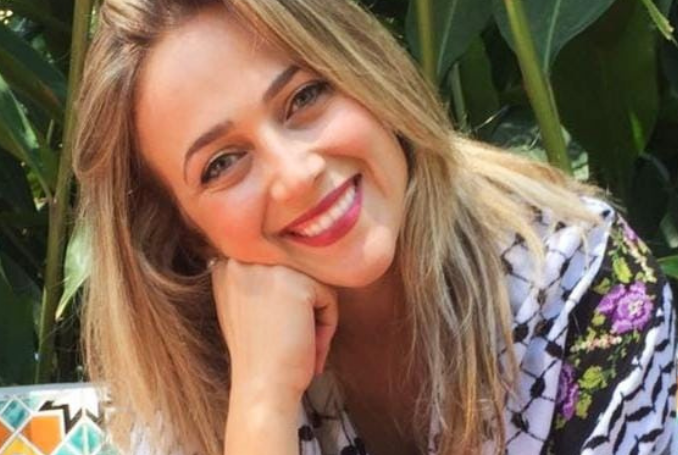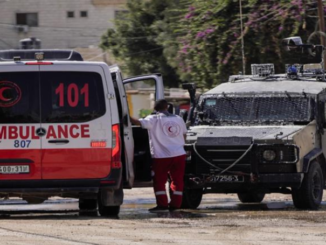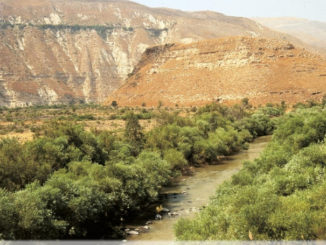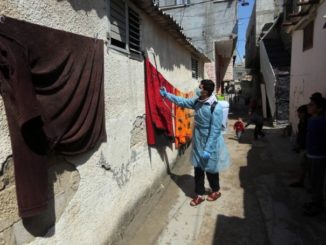
Painting land and people in vivid colors, Nazareth-born vocalist and researcher Dalal Abu Amneh embarked in Summer 2021 on a trip around Palestine for the Al Araby 2 series “Mishwar Sitti” (My Grandmother’s Journey), singing over 100 songs, uncovering local histories, and putting elderly women at the centre of telling their stories and struggles.
Bolstered by a group of instrumentalist shabab playing oud, buzuq and percussion, Dalal’s entourage explored regions of historic Palestine torn apart by an ongoing Nakba. As the series drew to a close on 31 March 2022, Dalal was visibly moved, telling cameras:
“In the months that have passed we have been on many journeys. We have travelled through all of beautiful Palestine, through our cities and our villages. We have gotten to know the stories of the people.”
Relatively few Palestinians could approach the kinds of geographic traversals of historic Palestine undertaken by Dalal and her group through the series. Writing of his own bittersweet return in “I Saw Ramallah” after the Oslo ‘peace’ deal, the late Palestinian poet Mourid Barghouti described the homeland through the metaphor of a song, asking:
“What love is it that does not know the beloved? And why were we not able to hold on to the song? Because the dust of fact is more powerful than the mirage of an anthem? Or because the myth had to descend from its lofty peaks to this real alleyway?”
“Mishwar Sitti” would summon the memories of its places and those who remained within, counting those displaced within the confines of their own ruptured homeland. These include Rabah Abdallah, an internally displaced Palestinian from Tabariyya (Tiberius), who leads the musicians on an emotional walk around the city, remembering its Turkish baths and pre-Nakba agricultural traditions. Treading towards her now colonized house, Rabah and Dalal break into “Marmar Zamani,” whose brokenhearted lyrics and maqam huzam melody have taken on new meaning for Tabariyya natives, forced in their entirety from its land:
Embittered were my days
How my days were embittered
Between songs, Rabah spies her home from afar and Dalal talks hopefully of her right to return. As in other episodes of “Mishwar Sitti,” the group sing celebratory songs from the zaffa, or wedding procession, filling ancient walkways with rhythmic energy and optimism.
زرعنا الميرمية ع باب الدار ??
أداء: دلال أبو آمنة، #مشوار_ستي pic.twitter.com/Zi65hhNjvF
— أغاني فلسطين (@PalestinianSong) March 20, 2022
On the same journey, under a gigantic fig tree remembered by dispersed residents of Qariyat al-Shajara (‘Village of the Tree’), Dalal and the shabab stand with 81-year old Abu Nasser, forced out with his family during the Nakba at the age of 7, and a cousin of legendary poet-singer Abu Arab. Gathered on soil expropriated by the Zionist state, Dalal begins with a well-known mawwal vocal introduction remembering the fruits of the land, as the group dedicate a rendition of the Abu Arab song “Hadi Ya Bahr” (Be calm, oh ocean) to the memory of a steadfast fighter for Palestine.
I swear to God and the revolutionaries
To never forget your right, my home
That no matter how long the journey
I will return to you, my village
Be calm, oh ocean, be calm
We have been long in separation
Offer my greetings
To the land that raised us
Overcome with emotion at the end of the singing, Abu Nasser is embraced by Dalal, who assures him, “we are returning, we are returning.” An ongoing message of sumud, a steadfast refusal to submit, flows through the music and stories.
Traveling to al-Khalil (Hebron) on March 8, Dalal is greeted by novelist and song researcher Ahmad Herbawi, who shows the women around the old city, dating to before 3000BCE. Al-Khalil was made a UNESCO heritage site in 2017, despite Israeli opposition. Like occupied Jerusalem, here is a Palestinian city where colonialism has bitten into its very heart, with continual Zionist ‘settlement’ setting a the city apart from itself, making preservation and research into al-Khalil’s cultural history an important element of social and political struggles. Past and present stories of the land are deeply connected, as Barghouti reminds us:
“We sing for it only so that we may remember the humiliation of having had it taken from us. Our song is not for some sacred thing of the past but for our current self-respect that is violated anew every day by the Occupation.”
Ahmad and Dalal discuss the ongoing expulsions of Palestinians from their houses as Israel attempts to Zionize al-Khalil. Ahmad explains: “To this day we are suffering the effects of the last 70 years of occupation, unable to preserve the cultural heritage of the city and to build economically.” To the group’s soundtrack of “Muntasib al-Qamiti Amshi” (‘I walk upright’), a Samih al-Qasim poem set to music by Lebanese icon Marcel Khalife, Dalal is filmed in admiration of traditional khazaf ceramics and the spirit of Khalili people: “Everything in al-Khalil is sumud. You live this occupation daily, maybe in the most difficult of cities in Palestine… facing a daily provocation.”
أغنية صاحبت بنادق الثوار.. "زرعنا الميرمية" من قلب #جنين#مشوار_ستي #فلسطين_قضيتي pic.twitter.com/ZwSSBitFxy
— fawaz Alazazmeh (@fawaz_ea) April 10, 2022
Highlighting the violent separation of Palestinians – and the limits of attempting a musical journey through Palestine – the “Mishwar Sitti” finale sees Dalal, the women and musicians connect symbolically to Gaza, “a city I have dreamed about visiting all my life… a university of sadness and joy, imprisonment and freedom, the past and the future, death and life.” Filming for the episode aimed to “challenge the obstacles” separating the Palestinian people, to “break the isolation of Gaza,” and “connect with our steadfast people.”
A live video link united Dalal’s group at the ancient coastal town of Tantura, south of Haifa, with a crowd of women on a Gaza beach. Dressed in traditional tatreez embroidery and aiming to reenact a Gazan zaffa, the experiment carried the joys and hopes of Palestinian women, who sang:
Gaza, oh pulse of our country
The splendor of your land is our land
Gaza, oh mighty people
Your banner raises with it Palestine
Not for the first time in the series, the musical gatherings felt like a demonstration, a demand to be heard. Symbolically standing on land facing intensifying encroachment evoked the protests and return campaigns of ‘48 Palestinians from Iqrit, Wadi Subala and other villages, where music and poetry have accompanied political demands. Dalal’s 13 March episode on music of the Naqab aired amidst escalating confrontation between the forces of the state and the popular power of Bedouin women and youth fighting back the Zionist land grab.
There are signs that the May 2021 Unity Intifada has galvanized and emboldened Palestinians across the land and Dalal’s long-standing devotion to cultural preservation rings true with the many radicalized by the movement. Opposing normalization, Dalal has supported a boycott of Israel’s ‘oud festival’ in occupied Jerusalem and, during the course of “Mishwar Sitti,” called for a boycott of the Dubai Expo over its feting of Zionism.
An expression of commitment to Palestinian women’s narratives, Dalal’s series sparked the interest of thousands of viewers. While mainstream media platforms like Al Araby may not themselves be “instruments of liberation,” to borrow a term from Leila Khaled, “Mishwar Sitti” shows that narratives against colonialist oppression, openly speaking and singing of the right of return can find a way to be heard.

– Louis Brehony is a musician, activist, researcher and educator. He is author of the book Palestinian Music in Exile: Voices of Resistance (2023), editor of Ghassan Kanafani: Selected Political Writings (2024), and director of the award-winning film Kofia: A Revolution Through Music (2021). He writes regularly on Palestine and political culture and performs internationally as a buzuq player and guitarist. He contributed this article to The Palestine Chronicle.








A magnificent novel approach to put PALASTINE on the map in this, easy on the ear and easy on the eye, fashion. The participation of this group of beautiful and devoted “ordinary” ladies gave the project an unprecedented character that touches the conscious of viewers. Dr Dalal’s sophistication, sincerity, originality and dedication to the cause of her people, added to her beautiful voice and unique delivery of a multitude of original Palestinian songs presented a powerful message that the Palestinian people are deeply rooted in human civilisation and can never be suppressed, beaten or washed away by this immoral occupation. A form of resistance worthy of praise and support.